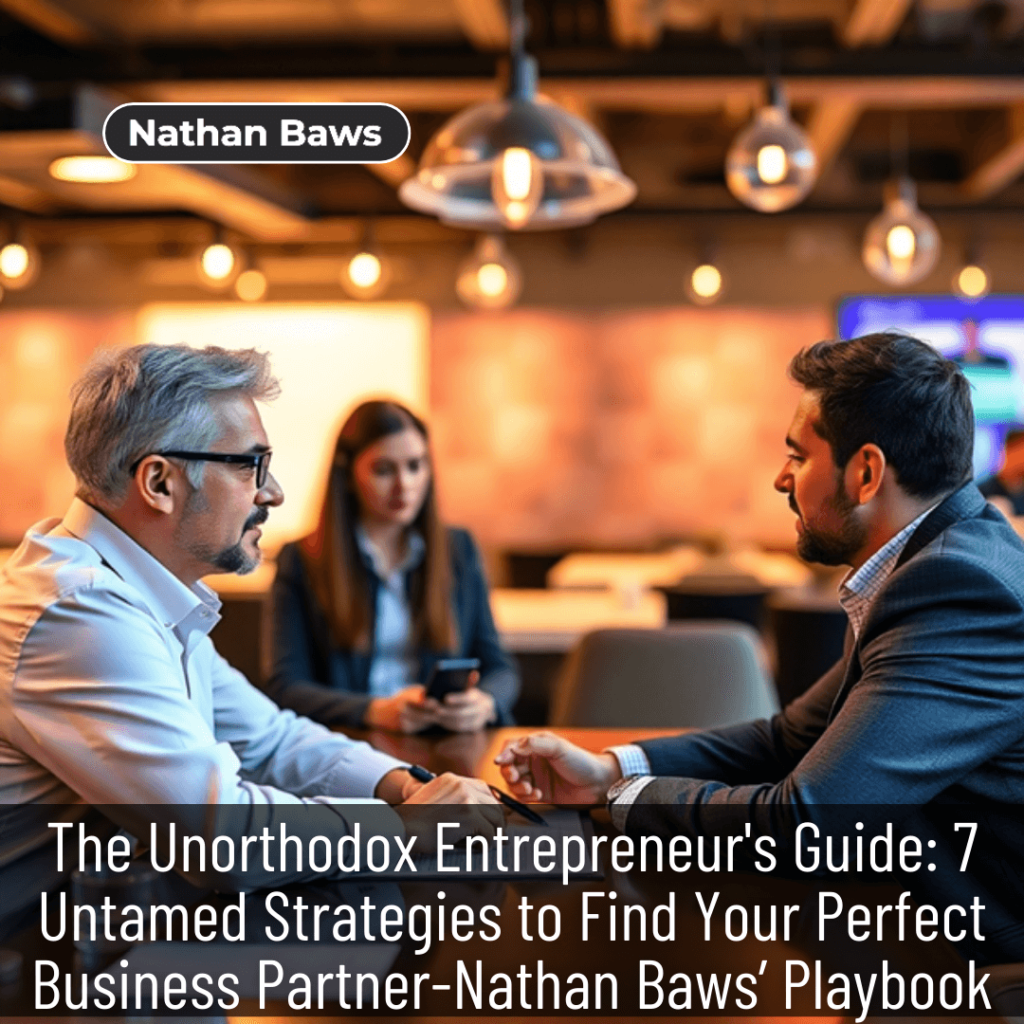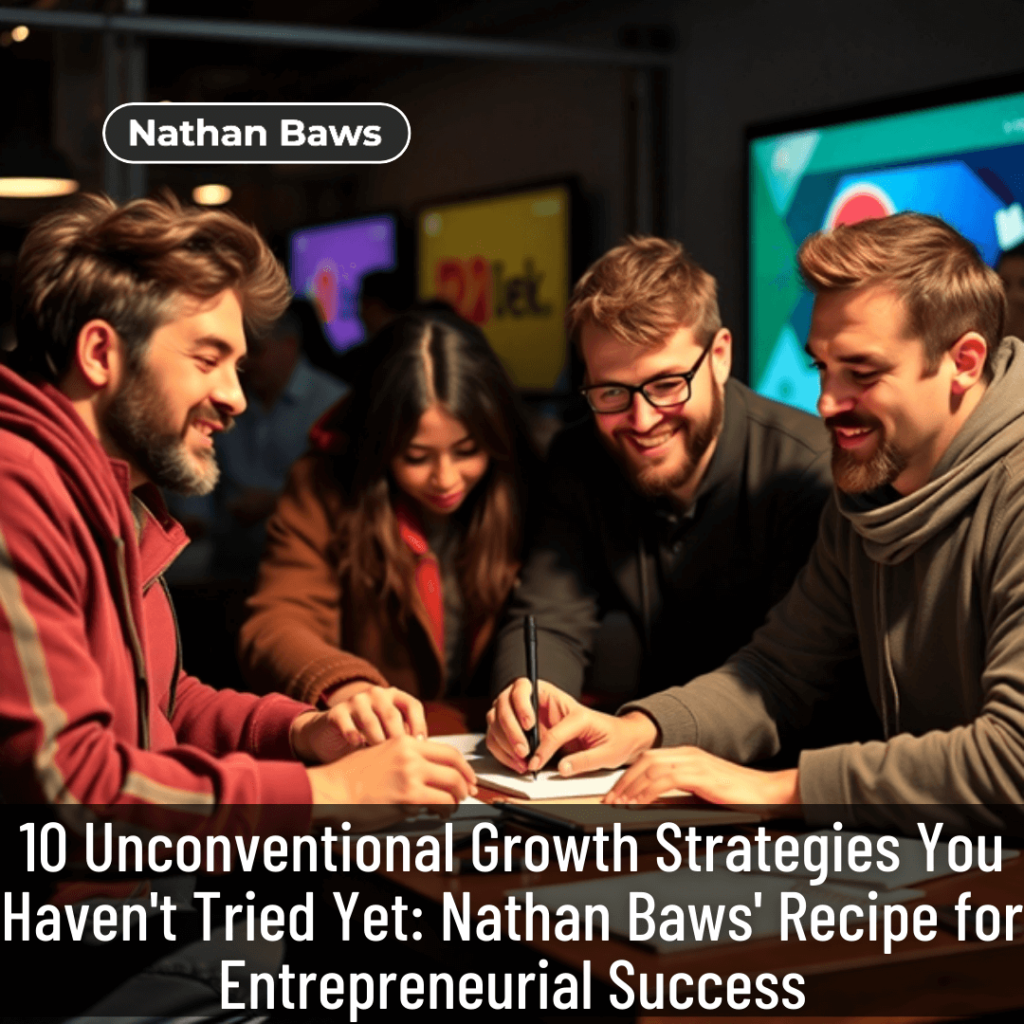Introduction
In the dynamic landscape of entrepreneurship, finding the right business partner can be a game-changer. It’s the equivalent of discovering a hidden treasure, a partner who complements your strengths, mitigates your weaknesses, and fuels your entrepreneurial fire. But where do you even begin to seek such a mythical creature?
The traditional route of job postings and lengthy interviews often leaves you with a pile of resumes and a gut full of disappointment. There’s a more unconventional approach, one that leverages creativity and strategy to connect you with your ideal partner.
As an entrepreneur with a penchant for unorthodox methods, I’ve built successful ventures with partners I found through some pretty wild (and surprisingly successful) approaches. This isn’t your standard business advice article. It’s a deep dive into the world of unconventional partnerships, filled with real-life examples, practical tips, and a touch of entrepreneurial magic.
The Goldilocks Zone: Finding the Perfect Fit
The first mistake most entrepreneurs make is seeking someone just like them. While shared passions are great, a truly powerful partnership thrives on synergy. You need someone who fills your gaps, not echoes your strengths. Think of it like Goldilocks and the three bears. Too similar (porridge too hot, bed too firm) and you’ll clash. Too different (porridge too cold, bed too soft) and you won’t function as a unit. The ideal partner balances your strengths and weaknesses, creating a dynamic duo that can tackle any challenge.
Character Traits Over Skillsets
Forget skills! Focus on character traits. You can teach skills, but you can’t inject work ethic, integrity, or a shared sense of humor. Here are some key character traits to prioritize in your “dream partner” search:
- Resilience: The entrepreneurial journey is a rollercoaster. You need someone who bounces back from setbacks with you, not jumps ship at the first sign of trouble.
- Communication Kung-Fu: Open, honest communication is vital for any successful partnership. Look for someone who expresses themselves clearly and actively listens to your ideas.
- Problem-Solving Puzzle Piece: You excel at strategy, but struggle with execution? Find someone who thrives on turning plans into action.
Finding Your Partner in Unusual Places
Let’s ditch the dusty job boards and embrace the unorthodox. Here are some unconventional ways to find your perfect business partner:
- Industry Events & Conferences: Network, network, network! Strike up conversations with like-minded individuals. You might just discover your ideal partner at a coffee break.
- Online Communities: Facebook groups, professional forums – niche online communities can be a goldmine. Look for passionate individuals who share your vision and values.
- Co-Working Spaces: The beauty of co-working spaces? Interaction! Get to know your fellow co-workers. You might find your perfect match sharing the next desk.
- Improvisation Classes: Yes, you read that right. Improv teaches adaptability, quick thinking, and effective communication – all crucial for a successful partnership. Plus, it’s a fun and creative way to meet new people.
Shared Vision, Unshakeable Values
Okay, you’ve found someone interesting. They’ve got the right character traits and fit your “Goldilocks Zone.” But there’s one more crucial element: shared vision and values.
Imagine spending countless hours building a business with someone whose ultimate goal contradicts yours. Recipe for disaster.
- Vision Alignment: Are you both striving for the same long-term goals? Is your vision for the business’s direction aligned?
- Values Check: This is non-negotiable. Integrity, honesty, and a strong work ethic are fundamental. Aligned values are the glue that holds your partnership together.

Putting the “Partner” in Partnership
Finding the right person is half the battle. Now, let’s make sure your partnership thrives. Here are a few tips:
The Trial Run
Before committing to a full-blown partnership, consider a trial run. This could involve collaborating on a smaller project or working together for a set period. This allows you to assess each other’s work styles, communication skills, and how well you complement each other.
Clear Communication Channels
Open and honest communication is the foundation of any successful partnership. Establish clear communication channels and set regular check-ins to discuss progress, challenges, and future plans.
Flexibility and Compromise
No two people are the same. Be prepared to compromise and adapt to each other’s working styles. A flexible and adaptable approach will help you navigate inevitable challenges and keep your partnership running smoothly.
Celebrate Successes, Learn from Failures
Celebrate your wins together, no matter how small. This fosters a positive and collaborative environment. Similarly, when things don’t go as planned, approach setbacks as learning opportunities. A united front in the face of adversity can strengthen your bond.
The Power of Unconventional Partnerships
Don’t limit yourself to traditional partnerships. Consider collaborating with individuals from diverse backgrounds and industries. These unconventional partnerships can lead to groundbreaking ideas and innovative solutions.
The “Odd Couple” Partnership
Sometimes, the most successful partnerships are between two individuals who seem like opposites. The key is to leverage your differences to create a powerful dynamic. For example, a creative visionary paired with a strategic thinker can be a formidable team.
The Mentor-Mentee Partnership
A mentor-mentee relationship can be a powerful way to learn from experienced entrepreneurs and build valuable connections. This can be a formal or informal arrangement, but the benefits are undeniable.
The Global Partnership
In today’s interconnected world, consider partnering with individuals from different countries. This can open up new markets, diversify your skillset, and expose you to different cultures and perspectives.
Nurturing Your Partnership for Long-Term Success
A successful partnership is like a garden. It requires constant care and attention to thrive.
Regular Check-ins
Schedule regular check-ins to discuss your progress, goals, and any challenges you may be facing. This helps keep your partnership on track and ensures that you’re both aligned.
Celebrate Milestones
Celebrate your successes together, no matter how small. This helps to boost morale and maintain a positive partnership dynamic.
Continuous Learning
Encourage continuous learning and personal growth. By investing in yourselves, you’ll strengthen your partnership and keep your business thriving.
Seek External Support
Don’t be afraid to seek advice from mentors, coaches, or business advisors. An outside perspective can provide valuable insights and help you navigate challenges.
Conclusion
Finding the right business partner can be a game-changer for your entrepreneurial journey. By following these unconventional strategies and nurturing your partnership, you can build a powerful team that achieves great things.
Remember, a great partnership is not just about business. It’s about building a strong, supportive, and enduring relationship.
Ready to take your business to the next level? Contact me and Let’s connect! Book a one-on-one consulting session or join one of my public speaking engagements to learn more about my unique approach to entrepreneurship and business growth.
FAQs
General Partnership Questions
1. How can I overcome personality clashes with my business partner?
Personality clashes are common in any partnership. The key is open and honest communication. Discuss your differences and find common ground. If the issue persists, consider seeking mediation or coaching to help you navigate the conflict.
2. What if we have different work styles?
Different work styles are common in partnerships. Establish clear communication channels and set expectations. Find ways to leverage your differences to complement each other’s strengths. For example, if one partner is a night owl and the other is a morning person, you could schedule important meetings during overlapping times.
3. How can we prevent burnout in our partnership?
Prioritize work-life balance and encourage regular breaks. Set realistic goals and avoid overcommitting. Regular check-ins can help identify potential burnout and address it proactively.
Decision-Making and Conflict Resolution
4. What if we disagree on a major decision?
Disagreements are inevitable in any partnership. Encourage open and respectful dialogue. Consider seeking a third-party opinion or taking a break to cool down. A well-structured decision-making process can also help minimize conflicts.
5. How can we maintain a healthy partnership in a remote work environment?
Schedule regular virtual meetings and use collaboration tools to stay connected. Prioritize clear communication and trust. Regular social interactions, even virtual ones, can help maintain a strong partnership.
Partnership Success and Growth
6. How can we measure the success of our partnership? Establish key performance indicators (KPIs) and track your progress regularly. Celebrate your wins and learn from your mistakes. A regular review of your partnership’s performance can help you identify areas for improvement.
7. What if we want to dissolve the partnership? Have an exit strategy in place. Create a clear plan for winding down the partnership and dividing assets. A well-defined exit strategy can minimize conflict and ensure a smooth transition.
Long-Term Partnership Health
8. How can we keep the passion alive in our partnership? Set new goals and challenges. Celebrate your successes and learn from your failures. Regular team-building activities and shared experiences can help strengthen your bond.
9. How can we attract investors to our partnership? Develop a strong business plan and pitch deck. Highlight your team’s experience, expertise, and unique value proposition. A well-prepared presentation can impress potential investors and secure funding.
10. How can we build a strong company culture within our partnership? Define your core values and mission statement. Encourage open communication, collaboration, and a positive work environment. Regular team-building activities and social events can help foster a strong company culture.
Key Takeaways from the Unorthodox Entrepreneur’s Guide
| Key Point | Explanation |
| Finding the Right Partner | Look for someone who complements your skills and shares your vision. |
| Unconventional Methods | Use creative approaches to find your ideal partner, such as joining improve classes or networking at industry events. |
| Building a Strong Partnership | Prioritize open communication, mutual respect, and shared values. |
| Overcoming Challenges | Be prepared to compromise, adapt, and seek external support when needed. |
| Nurturing Long-Term Success | Continuously learn, celebrate milestones, and foster a positive partnership culture. |


